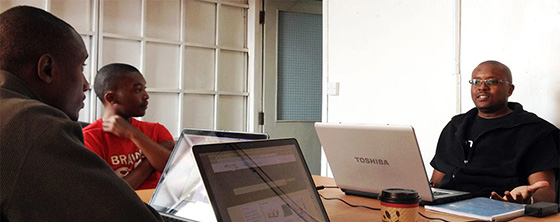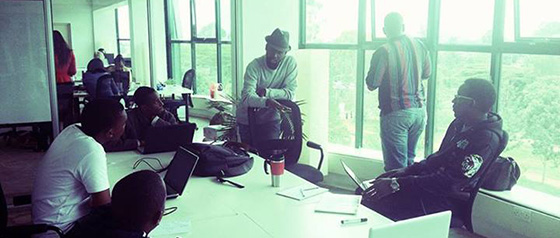In the humble beginnings of my design work, I was guided by two principles: be the best at what you do, and truly care about the people you work with and work for. These still hold, and I believe are succinctly captured in Skyline’s slogan: African skin, Martian skills. They have been overarching mantras and mental lodestones in blurry, tiring, and often discouraging times.
The devil, however, is in the details—as I quickly came to learn. Having metaphysical ideals is essential, but what you do on a daily is what makes or breaks whatever it is that you’re trying to build. It gets even more complicated when you’re in charge of a growing team of crazily talented but uniquely challenging Martians. Keeping your head in the clouds of future vision and your feet on the ground of imminent reality becomes a gruelling balancing act that no one can adequately prepare you for.
I thank God for the blessing of my parents who hard-wired into me the manly mindset of responsibility (and lovingly spanked out as much of the opposite as they both could). They gave me the universals, but I’ve had to learn the specifics on my own.
So here are a few practical things that I think are worth sharing with you:
1. Show up. Regardless.

Know that terrible “wish the ground would open up and swallow me” kinda feeling you get when someone’s calling and you haven’t done what you were supposed to do for them? Or when your alarm doesn’t go off yet you were supposed to wake up and work on something before an appointment? I know it all too well. The temptation is to ignore the call, or skive the meeting, but that can so easily break the fragile trust that you’re trying to build with a client (who’s paying you!). So I’ve learnt to show up regardless. If it’s a phone call, I force myself to pick it. If I don’t, I take a few minutes to compose myself and think of a feasible promise I can make, then call back immediately.
NB: Often, I’ve found that the client was either calling me about something totally unrelated to what I’d thought, or they’d also had a busy time and their timelines had changed as well.
2. Be completely honest
Kenyan’s can come up with lies at the drop of a hat yaani! A guy in a matatu will tell the person on the other end of the phone that they’re stuck in the office. No one in the matatu acts surprised. It’s almost normal, and I just don’t get that.
I find honesty so liberating.
If the team is spread out too thin and we can’t take on new work, that’s exactly what I tell the client. If we don’t think the e-commerce or social networking web site they want to build makes sense, we tell them that. If by the look of things we’re going to miss the deadline by two weeks, that’s what we say. Instead of turning off our clients, the effect has been quite the opposite. If it’s a deadline, the client is able to adjust beforehand instead of being eventually inevitably disappointed. Even as I write, there is work waiting for us in January because a client who appreciates our skill and honesty is willing to wait.
3. Apologize sincerely
One of the hardest things to do is say, “I messed up, and I’m sorry”. It’s so much easier to give excuses and explain things away. I used to do that a lot when freelancing, but I had to man up when I started leading a team. I’d expect something to be done by a certain time, and as is usual in an imperfect world, it sometimes ended up not being done. I realized that I wasn’t happy when the first thing that came out of a colleague’s mouth was an excuse. If that was how I felt, then surely my clients aren’t happy when the first thing I give is an excuse.

Apologizing implies you admit something was your responsibility, and that you failed, whether or not an earthquake or tsunami is the reason why. Few people will remain angry when you’ve shown that you’re open to rebuke and willing to admit your errors.
But if you think apologizing to a client is difficult, wait till you have to apologize to someone who answers to you. Heh, that’s some seriously humbling stuff, man! But it’s absolutely necessary, and stronger bonds of brotherhood and unity are forged in such times than in fun and laughter.
4. Delegation ≠ Abdication
I have come to see the importance of delegation. It’s an admission that you can’t do everything yourself. In fact, others can do many things way better than you, which is why they are there in the first place! That’s the easy part. The hard part is the fact that even though you’ve delegated the work, you still maintain the responsibility of ensuring the task is completed.
So when we go for a meeting and a certain milestone hasn’t been reached on time, I don’t tell the client, “Martian X here will explain himself”. No. I avoid mentioning names as much as I possibly can, and I take the blame on behalf of the team. They (ideally) already apologized to me; I don’t need to make them do the same to the client again. I’m in charge, so I’m the one who failed the client.
5. Respect other people’s time
You won’t know how terrible a lack of time consciousness is until you decide to start keeping time yourself. It’s really annoying when you’ve left home at 6am in the morning to be at a meeting at 7:30am, then the fella shows up at 8:45am and says “traffic”. What tha?! Of course there was going to be traffic! I woke up at 5am coz of the freakin’ traffic!
Sadly, I didn’t feel the weight of this a few years ago. Now, however, I try to be on time as much as I possibly can. If I’m running late, I’ll call and let the person know I’m running late. If I’m not going to make it, I try to communicate that as promptly as possible so that whoever’s expecting me doesn’t end up wasting their time waiting (and sipping a mug of coffee that they didn’t have to).
6. Quick to hear, slow to anger
Working with a team is an exciting and challenging experience, but it has its valleys. Misunderstandings and conflict are not unheard of. The problem in such cases is that each person can be tempted to jump to conclusions based on their own point of view.
I try not to get angry or draw a conclusion until I’ve heard each perspective and considered the issue from as many angles as possible. Sometimes there’s reason to be angry, but most times, everyone was really just trying to do their thing the best way they could and make awesome stuff until some contingency came up or miscommunication happened.
7. Give credit where it’s due

This is the flip-side of taking blows for the team. When a Martian has done exceptionally well, I don’t hesitate to let the client know it was them who made it happen. The Martians are the ones who make the magic happen, and I’m just so glad that I get to be a part of this amazing team and see our clients (and their clients) smile upon the work of our hands.
I’m sure there are many more lessons to be learnt further down this road, but thank God for baby steps.
Have a responsible day!